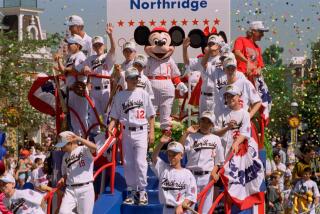Champions in a World of Silence
- Share via
They never hear the cheers.
Not because they haven’t earned any. The Pierce Valley women’s slow-pitch softball team won the B Division championship in the City Municipal League several months ago. That followed an earlier summer triumph in Charlotte, N.C., where the squad won its third consecutive national championship.
No, the lack of audible cheers has nothing to do with the Pierce players’ ability to excel. Just their ability to hear.
The Pierce Valley team, you see, comprises 14 hearing-impaired women whose deafness ranges from partial to nearly total.
The team is part of the 80-member Pierce Valley Recreation Club, a nonprofit organization formed largely from Pierce College students in 1978 to promote athletic and social activities for the deaf. Both men and women are involved in sports ranging from basketball to volleyball.
But for the women, softball has become the big hit. In 1981, Pierce Valley won its regional, then finished as runner-up in the national championship tournament of the American Athletic Assn. of the Deaf in Grand Rapids, Mich.
That, however, proved to be just a warmup.
The Pierce women returned to win the national event in 1985, when the site had been moved to St. Louis, and in ’86 in Atlanta. The team pulled a hat trick in September of this year when Pierce again proved to be the best of the 16 finalists from around the country.
But perhaps the Pierce women’s triumph in the city league, against teams with normal hearing, was their most significant because what they won this time was self-respect and the knowledge that their handicap need not limit them in the so-called “normal” world.
“We just have to concentrate more,” said Sandy Hart of Arleta, an outfielder for Pierce Valley. “We have to depend more on our visual ability, watch everything.”
The sounds of silence can be just as joyous as those of the loud variety. You do not have to hear in order to high-five somebody. Pierce Valley players, who range in age from 19 to 40, congratulate each other and bolster themselves on the field with sign language. Their emotions flow through their fingers rather than their vocal cords, but the effect is the same.
As each opposing batter comes up, Greg Brown of Canoga Park, the Pierce Valley manager, motions to his defense where that batter hit the ball in her previous at-bat.
But it is not all that easy. The outfield can be a dangerous place when two outfielders are in mad pursuit of the ball. Normally, those outfielders have the luxury of calling for it, knowing that such a signal usually will cause a nearby teammate to veer off before a damaging collision occurs.
Pierce Valley has no such luxury.
“We just know our limits,” explained Jamie Fisher of Pasadena, the shortstop. “We know what each person can do. It’s like mind reading.
“If, for example, there’s a pop fly to left field, the left fielder knows what I as the shortstop can do, how far I can range. And we wave when we think we can make the catch.
“We’re always reminding each other how many outs there are. It’s like a telephone line. The catcher, Tina Morgan, flashes to us in the infield. We flash a sign to the outfield.”
There are other differences in respect to other teams. For example, Pierce Valley batters must turn around and look at the umpire after every pitch to see if it was a ball or a strike since they cannot hear the call.
That can be an advantage, too. If they don’t like the call, Pierce Valley hitters can grumble all they want and the ump cannot warn them to cool it.
Of course, he can try to warn them, but if you can’t hear. . . .
There’s one big similarity between Pierce Valley and all other traveling amateur teams: the need for money. They do all the usual things to raise cash--car washes, social events and the rest, but that is not enough.
The team currently is looking for a sponsor before next year’s national tournament. It’s the chance to root for more than just hits and runs.
“What we want to do,” Morgan said, “is to prove our handicap does not limit us, to go beyond what people expect of us. We surprise a lot of people.”
Yes, deaf people can hear the cheers.
More to Read
Get our high school sports newsletter
Prep Rally is devoted to the SoCal high school sports experience, bringing you scores, stories and a behind-the-scenes look at what makes prep sports so popular.
You may occasionally receive promotional content from the Los Angeles Times.






